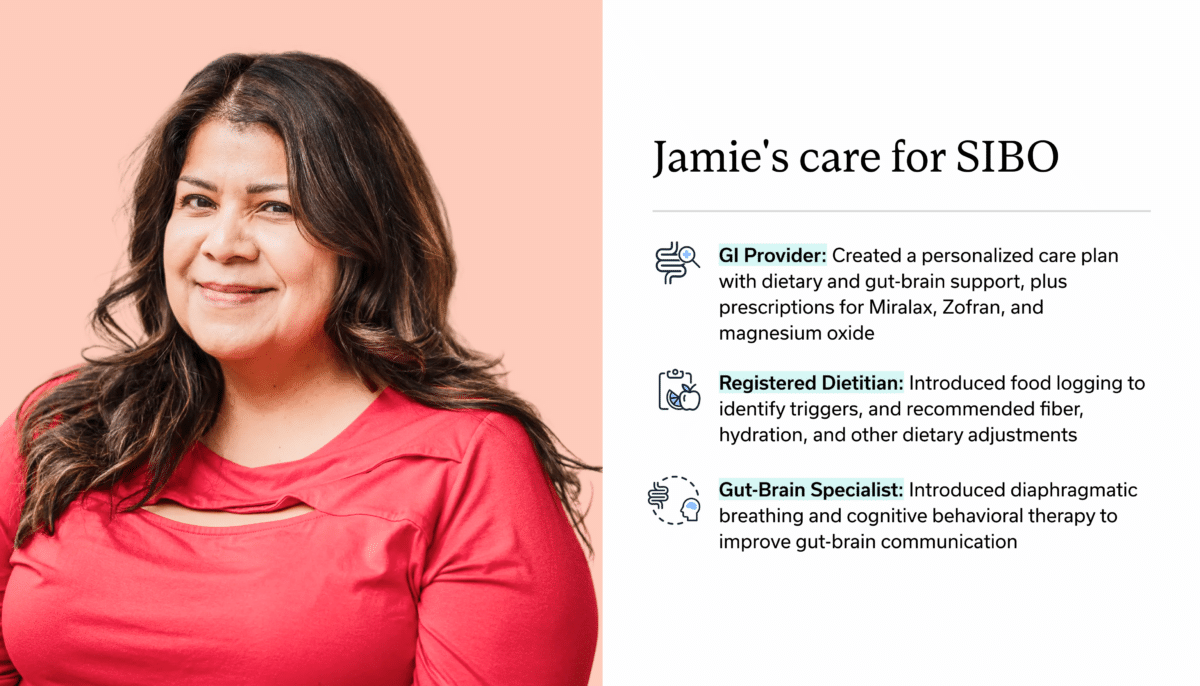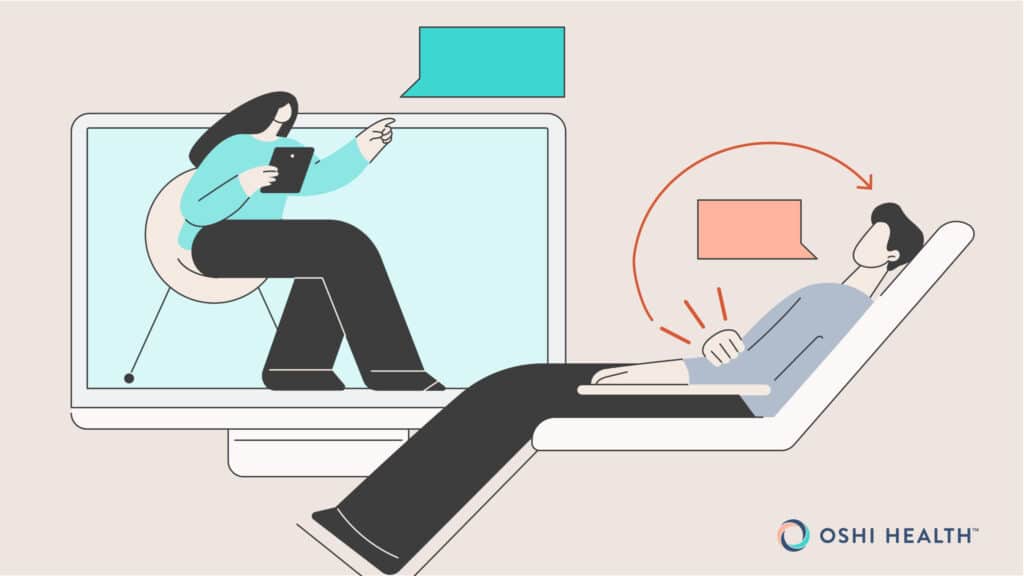 SIBO Overview
SIBO Overview
Small intestinal bacterial overgrowth (SIBO), also known as bacterial overgrowth or small bowel bacterial overgrowth syndrome, is exactly what it sounds like: an overgrowth of bacteria in the small intestine.
It typically happens when something causes the passage of food through your digestive system to slow down, making it easier for bacteria to multiply and causing uncomfortable symptoms like diarrhea, bloating, abdominal pain, and discomfort with eating. In severe cases, SIBO can also make it harder for your body to properly absorb nutrients, leading to weight loss and malnutrition.
Because SIBO symptoms come and go and often mimic other gut health conditions, you might struggle for a long time without getting answers, but the good news is that you’ve come to the right place.
Read on to learn about SIBO symptoms, causes, risk factors, and complications—and how we can help you find relief.
SIBO symptoms
Wondering if your symptoms might be SIBO or looking to better understand your condition? Let’s explore some of the signs of SIBO and get you the answers you need, whether you’re newly concerned or already have a diagnosis.
Symptoms that might be related to SIBO can include:
- Loss of appetite
- Nausea
- Abdominal pain
- Bloating
- Diarrhea or constipation
- Feeling uncomfortably full after eating
- Unintentional weight loss
According to research, SIBO is present in over a third of people with gastrointestinal (GI) symptoms—given what we know about how many people live with GI discomfort or a chronic GI condition, that’s a lot of people!
At Oshi Health, our GI specialists, including GI providers, registered dietitians, and gut-brain specialists, work together to address your symptoms.
My provider was patient and very knowledgeable about SIBO. She answered my questions and gave me a good plan to move forward.
— Stephanie, Oshi Health patient
SIBO causes
In people with SIBO, the small intestine has an excessive amount of bacteria, which leads to uncomfortable symptoms like gas, bloating, and abdominal pain.
Causes of SIBO include:
- Certain medications. Antacids and proton pump inhibitors (PPIs) can lower the amount of acid in your stomach, making it easier for bacteria to multiply. Some medications, like opioids, anticholinergics, and antidiarrheals, slow digestion and cause food to sit in your GI tract. Frequent or long-term antibiotic use can also contribute to SIBO by disrupting bacterial balance in your gut.
- Surgery. Certain surgical-related changes to the GI tract or complications from GI surgery can interfere with your stomach’s ability to produce acid and control gut bacteria.
- Medical conditions. Hypothyroidism, scleroderma, immune deficiency, diabetes, gastroparesis, H. pylori, Crohn’s disease, celiac disease, liver disease, and other health conditions can promote bacterial growth in the small intestine.
- Structural problems of the small intestine. Physical blockages due to GI conditions or surgical complications and pockets called diverticulosis can make it more difficult for your small intestine to clear waste, boosting bacterial activity.
SIBO risk factors
Just because you have a risk factor doesn’t mean you’re destined to experience SIBO, but it can mean you’re more likely to develop the condition than someone else.
SIBO risk factors include:
- Being older. As you age, you produce less stomach acid, which can influence bacteria levels in your GI tract.
- Having had abdominal surgery or cancer treatment. Medical procedures like surgery or radiation therapy can impact the health and structure of your small intestine, making it more vulnerable to bacterial imbalances.
- Having a weakened immune system. If your immune system is less effective due to a health condition or treatment for a health condition, certain bacteria may have more opportunities to grow.
- Having a GI condition. There’s a strong link between disorders like irritable bowel syndrome (IBS) and Celiac disease and SIBO.
Evidence also suggests a possible link between SIBO and serotonin level changes. The hormone serotonin is a neurotransmitter, a chemical that acts as a messenger between the nerve and brain cells and cells throughout your body. It plays a role in regulating body temperature, sleep, sex drive, hunger, and mood—which is why it’s frequently dubbed the “feel-good chemical.”
Research suggests that about 90% of your body’s serotonin is produced in the gut. When your gut health is out-of-whack because of a condition like SIBO, it may lead to issues regulating serotonin production, impacting your overall emotional well-being—hello, gut-brain connection.
SIBO complications
SIBO can make it harder for your body to absorb nutrients, including macronutrients like fat, protein, and carbohydrates. In severe cases, SIBO can lead to malnutrition and nutrient deficiencies—that’s why it’s important to work with a registered dietitian who has experience with GI conditions like SIBO.
SIBO complications can vary depending on the particular type of nutrient deficiency. For example, being deficient in vitamin B12 can lead to anemia and problems with your nervous system.
Addressing and managing your symptoms can make you less likely to experience complications.
SIBO diagnosis
The first step toward an SIBO diagnosis is a thorough medical history. At Oshi Health, our multidisciplinary GI specialists consider the whole you when working together to make a diagnosis, including your medical history, symptoms, and lifestyle.
An integrated team of GI specialists, working together for you
Our expert gastroenterologists, GI providers, registered dietitians, and gut-brain specialists are leaders in their fields, with advanced education and training in gastroenterology. Our comprehensive team approach is personalized to meet your unique needs and address the root cause of your symptoms.
Your GI care team will ask you questions about your symptoms, like when they first started or whether certain foods or behaviors tend to make certain symptoms worse.
They’ll also consider the following:
- Your diet and potential trigger foods
- Lifestyle habits
- Any medications or supplements you’re taking or have already tried for your symptoms
- Stress and behavioral health
- Previous surgeries or medical procedures
- Your family history of GI conditions
And while you don’t need to have had previous testing to meet with an Oshi provider and benefit from our integrated GI care, your provider will review any previous testing you’ve gone through, if any.
Your provider may also recommend further testing. Testing may include:
- Blood tests for SIBO can determine whether or not you have a deficiency due to poor nutrient absorption.
- Stool tests for SIBO check for undigested bile acids and fats, which may signal you’re not absorbing nutrients properly.
- Imaging for SIBO looks for structural issues that may be contributing to poor GI function and emptying.
You may have also heard of breath testing for SIBO. A breath test can detect the amount of hydrogen or methane in your breath. High levels may mean your gut is overproducing gas-emitting bacteria or methane. But breath testing can be expensive, and may not always be reliable.
We try to avoid putting you through unnecessary and repeat testing. If our providers recommend diagnostic or other testing, we take a concierge approach to help you find a convenient and in-network location.
In-network with most major health plans
Unlike traditional healthcare providers, we don’t bill on a per visit basis. With insurance coverage, most Oshi Health patients get a year of unlimited care and only pay for four in-network specialist visits. For those four visits, copays and deductibles apply based on your plan benefit details.

SIBO treatment
At Oshi Health, we take a comprehensive approach to SIBO treatment, addressing not just your symptoms but also putting you on a path to better digestive health. Here is an example of how our care team supports Jamie with SIBO, bringing together medical treatment, dietary guidance, and gut-brain support in one personalized plan.

Here’s what that entails:
1. A symptom-based approach
Some symptoms might seem like SIBO, but could be the result of other common causes, like IBS.
Our GI providers will review all of the potential causes of your symptoms and together, you’ll discuss the best way to treat your symptoms individually.
2. Prescribing or recommending medications
If your GI provider determines that your symptoms are related to SIBO, medications are often part of personalized treatment plans.
Antibiotics are typically the first-line treatment for SIBO, helping to control bacterial overgrowth. Before prescribing antibiotics, our providers take into consideration any allergies you may have, previous antibiotic use, potential medication interactions with drugs or supplements you’re currently taking, and medical conditions that may make antibiotic use unsafe.
Commonly prescribed antibiotics for SIBO include:
- Ciprofloxacin
- Amoxicillin-clavulanic
- Doxycycline
- Metronidazole
- Neomycin
- Norfloxacin
- Tetracycline
- Trimethoprim-sulfamethoxazole
- Rifaximin
Your provider may also recommend supplements if you have a diagnosed nutrient deficiency resulting from SIBO.
Additionally, your provider may recommend medications, like magnesium oxide, to help with constipation due to SIBO.
Medications are just one piece of the journey to symptom relief.
3. Identifying triggers & making dietary and lifestyle adjustments
What does your typical diet look like? Do you have dietary triggers that seem to make your digestive symptoms worse?
Our registered dietitians will help you identify your symptom trigger foods and find ways to modify your diet without necessarily giving up the foods you love.
They may recommend:
- A soluble fiber supplement
- Targeted enzyme supplementation, if necessary
- Adjusting the amount of fat in your diet
- Assessing FODMAPs in your diet and limiting them if they’re a trigger for your symptoms
- Eating smaller, more frequent meals
4. Working on the gut-brain connection
Did you know your brain and digestive system are in constant communication? It’s why you might feel butterflies in your stomach when you experience heightened emotions like stress or excitement.
The close link between your gut and mind can also play a role in gut health conditions like SIBO.
Our gut-brain specialists can help you identify potential stress-related symptom triggers.
Gut-brain specialists are trained and licensed behavioral health professionals with specific experience treating GI concerns like SIBO. Working alongside GI providers and registered dietitians, they can help you take control of your symptoms by providing you with the skills and tools to cope with distressing thoughts, feelings, and physical reactions that may be contributing to GI distress.
This might include:
- Relaxation strategies to manage stress, including diaphragmatic breathing exercises and mindfulness meditation
- Cognitive behavioral therapy (CBT) for GI symptoms to help you better cope with negative emotions that can worsen symptoms
- Acceptance and commitment therapy (ACT) for GI conditions to move towards a place of acceptance and identify the ways you might be avoiding certain situations, which could make it more challenging to cope with symptoms
Oshi Health gut-brain specialists are here to support you as you navigate living with a chronic digestive health condition, helping to normalize and validate your GI-related concerns—so you never feel alone in your journey to symptom relief.
4. Whole person care for SIBO
At Oshi Health, no two treatment plans are the same.
Our GI specialists work together to create a personalized treatment plan to address your symptoms. We consider the whole you—not just your SIBO diagnosis. That means taking into account diet, lifestyle, and the gut-brain connection, ensuring you get the individualized care you need.
Already seeing a GI provider? We can provide support between visits and work with your existing gastroenterologist as an extension of your care.
- decrease in unnecessary (and expensive) procedures and tests
- of undiagnosed patients get a clear diagnosis within 3 months
- of patients report better quality of life, with less stress and anxiety, within 3 months
Source: Results of a clinical trial conducted in partnership with a national health plan
Oshi is your partner in digestive health
Feel like your digestive concerns are running your life? You’re not alone—and we’re here to help you find lasting relief.
Oshi Health GI providers, gut-brain specialists, and registered dietitians work together to address the root cause of your symptoms and find solutions that actually work for you.
Whether you’re dealing with chronic digestive issues or unpredictable symptom flare-ups, our GI specialists deliver:
✔ Personalized care plans tailored to your lifestyle
✔ Science-backed strategies to calm your gut
✔ Compassionate, whole-person care
✔ And so much more!
Ready to take control of your gut health?
Frequently Asked Questions
-
Small intestinal bacterial overgrowth (SIBO) causes uncomfortable symptoms like excess gas, diarrhea, constipation, and bloating. When these symptoms become severe, they can even cause debilitating abdominal pain
-
Antibiotics are typically the first-line treatment for SIBO, but our GI providers can make treatment recommendations based on your unique needs.
-
Yes. With a combination of medication, diet changes, lifestyle adjustments, and gut-brain interventions, it’s possible to address the underlying cause of SIBO and get relief from uncomfortable symptoms.
-
Methane SIBO or IMO for intestinal methanogen overgrowth) is a specific type of small intestinal overgrowth involving excess levels of methane gas production. It’s typically associated with constipation.






